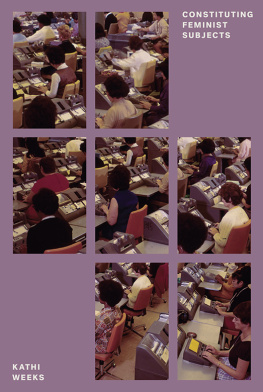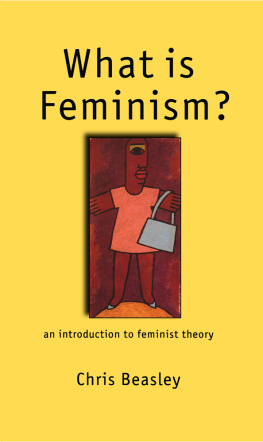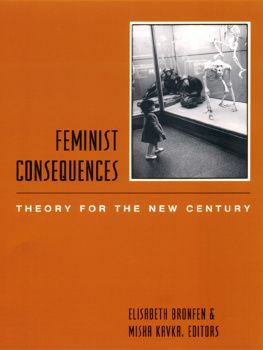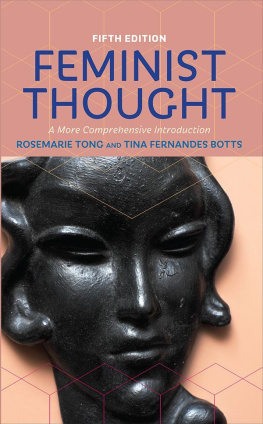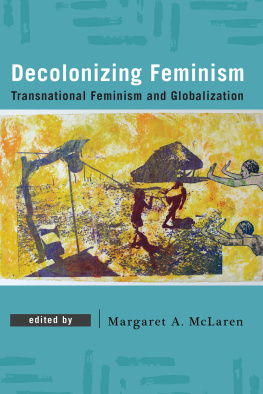CONSTITUTING
Feminist Subjects
KATHI WEEKS

This edition published by Verso 2018
First published by Cornell University Press 1998
Kathi Weeks 1998, 2018
All rights reserved
The moral rights of the author have been asserted
1 3 5 7 9 10 8 6 4 2
Verso
UK: 6 Meard Street, London W1F 0EG
US: 20 Jay Street, Suite 1010, Brooklyn, NY 11201
versobooks.com
Verso is the imprint of New Left Books
ISBN-13: 978-1-78663-603-4
ISBN-13: 978-1-78663-604-1 (UK EBK)
ISBN-13: 978-1-78663-605-8 (US EBK)
British Library Cataloguing in Publication Data
A catalogue record for this book is available from the British Library
The Library of Congress Has Cataloged the Previous Edition as Follows:
Weeks, Kathi, 1958
Constituting feminist subjects / Kathi Weeks.
p. cm.
Includes bibliographical references and index.
ISBN 0-8014-3427-0 (cloth : alk. Paper). ISBN 0-8014-8447-2
(pbk. : alk. paper)
1. Feminist theory. 2. Subjectivity. 3. Subject (Philosophy) I. Title.
HQ1190.W43 1998
305.42dc21 97-52190
Printed and bound by CPI Group (UK) Ltd, Croydon, CR0 4YY
CONTENTS
I am deeply indebted to Christine DiStefano, Nancy Hartsock, Dan Lev, and Michael McCann for the many ways they have inspired, supported, and encouraged me over the years. I am also grateful to Michael Hardt, Fredric Jameson, and Karen Stuhldreher for helpful comments on the manuscript and to my editor at Cornell, Alison Shonkwiler, for her guidance.
I want to acknowledge some of my colleagues at Fairfield University, Kevin Cassidy, Ed Dew, Don Greenberg, Alan Katz, Dennis Keenan, John Orman, and Sally Williams, for creating such a congenial environment in which to work. My special thanks to Marcie Patton for all her material and emotional support. In addition, a summer research stipend from Fairfield University provided some timely funding.
Brittany Faulkner and Julie Walwick saw this project through from beginning to end, and I am continually grateful for their love and friendship. Many thanks as well to Robert Adelman, Carol DiMarcello, Brian Henderson, and the rest of the humans and animals at 5251.
Finally, I dedicate this book to my parents, Lee Weeks and Hal Weeks, and my sisters, Regan Weeks and Diana Weeks.
K. W.
CONSTITUTING FEMINIST SUBJECTS
I n the wake of the postmodern critiques of the 1980s, feminists have been struggling to develop theories of the subject that are adequate to a feminist politics. Many of us want to move beyond models of the subject organized with reference to a natural core, authentic humanity, or enduring metaphysical essence and to trade the older focus on the unified subject of feminism for a multiplicity of feminist subjects. At the same time, we want a theory of feminist subjectivity that can acknowledge feminisms antagonistic force and cultivate its subversive potential, one that does not simply attach to a theory of social determinacy a vague evocation of voluntarist refusal. For us, then, the puzzle has been to understand how it could be that subjects so systematically constructed and well prepared to submit to the existing order of things can also collectively defy it. In other words, we want to endorse the critiques of humanism, functionalism, determinism, and essentialism without denying the possibility of agency.
This project, however, has been hampered by certain stubborn remnants of the modernist-postmodernist paradigm debate, a debate that helped to set this agenda but that also placed certain limits on our ability to pursue it. Although many will argue that the modernist-postmodernist debate that animated political theory and feminist theory throughout most of the 1980s is finished, having exhausted its potential, it lingers on nonetheless in the way we recall arguments from the past and conceive alternatives for the future. Here I focus on one specific configuration of this debate, a form that should be familiar to those of us reading in political theory and feminist theory over the years, wherein modernism and postmodernism are conceived as mutually exclusive theoretical paradigms. According to this particular conception of the debate (and of course, it is not the only way that the debate was conceived), the modernist tradition (with its wealth of differences) was equated with a paradigm that perhaps most closely resembled certain themes within Enlightenment modernism, poststructuralism (in all its heterogeneity) was identified with something called postmodernism, and the rest of us were compelled by the relentlessly oppositional logic used to maintain this dualistic framework to choose either one side or the other. By means of this formula, modernism was all too often effectively reduced to a caricature opposed to another caricature called postmodernism. This reactive dynamic left us with two equally unsatisfactory choices: a reaffirmation of the humanist subject in some form or the death of the subject tout court, a voluntaristic theory of political agency or a thoroughgoing social determinism. What now remains in the wake of this particular formulation of the debate (a formulation I refer to as the modernist-postmodernist paradigm debate) is a history of distortions and a continuing inability by many to recognize the potential of, and the nuances within, the rich traditions of thought that were subsumed into the category of modernism and the equally valuable theoretical frameworks confined by the category of postmodernism. The vestiges of this paradigm debate can also account for some of the defensiveness and dismissiveness that continues to characterize many of our exchanges. The modernist-postmodernist paradigm debate may be dead, but its legacy still haunts our analyses.
If we were to comply with the terms of this paradigm debate, the project of developing a nonessentialist theory of subjective agency would be a very difficult one indeed: too many potentially productive lines of inquiry would be closed to us. Thus my project is conceived in part as an effort to circumvent this propensity toward either/or formulas and to counter this inattention to the specificity of, and the potential affinities among, different theoretical undertakings. Here I present a nonessentialist theory of feminist subjectivity that draws upon a variety of resources, including postmodernists like Friedrich Nietzsche, Michel Foucault, and Judith Butler, as well as modernists from the Marxist and socialist feminist traditions. By staging their encounters on a different terrain, outside these paradigm categories, I believe that we can develop some potentially productive lines of dialogue among these diverse theoretical projects.
Feminist Standpoint Theory
I cast this reconfiguration of a feminist subject in terms of a version of socialist feminism known as feminist standpoint theory. The tradition of standpoint theory includes the contributions of many theorists who propose very different arguments.
But why would I want to begin with standpoint theory? According to its critics, feminist standpoint theory is a relic of a bygone era in Anglo-American feminism: a throwback to an outmoded 1970s agenda, an archaic mode of theorizing anchored in the second rather than the third wave, a humorless operation in contrast to a playful gesture, in short, an obsolete approach situated within a modernist as opposed to a postmodernist horizon. If we accept the characterization presented by many of these reviewers, standpoint theory is so thoroughly mired in the pitfalls and conundrums of an older, irreparably foundationalist and essentialist brand of feminism that it can no longer speak to our concerns. There is, of course, some truth to this indictment: like the larger body of socialist feminist theory of which it is an instance, standpoint theory grew out of a particular historical conjuncture with its own specific openings for, and obstacles to, theoretical reflection; some of these we cannot recreate, others we would not wish to. The problem with this assessment, however, is that while it may serve to help us identify some of standpoint theorys failings (although, in this form, the critique is indebted to the modernist-postmodernist paradigm debate and, therefore, too often based on a caricature to provide many accurate critiques), it is blind to its distinctive strengths and potential contributions. While remaining alert to standpoint theorys weaknesses, I want nonetheless to argue for and expand upon its continuing promise and vitality. There are three fundamental reasons why I choose to enroll standpoint theory in this project of reconstituting a feminist subject, three sources of its enduring power and relevance. These can be encapsulated within three of its key concepts: totality, labor, and standpoint.

